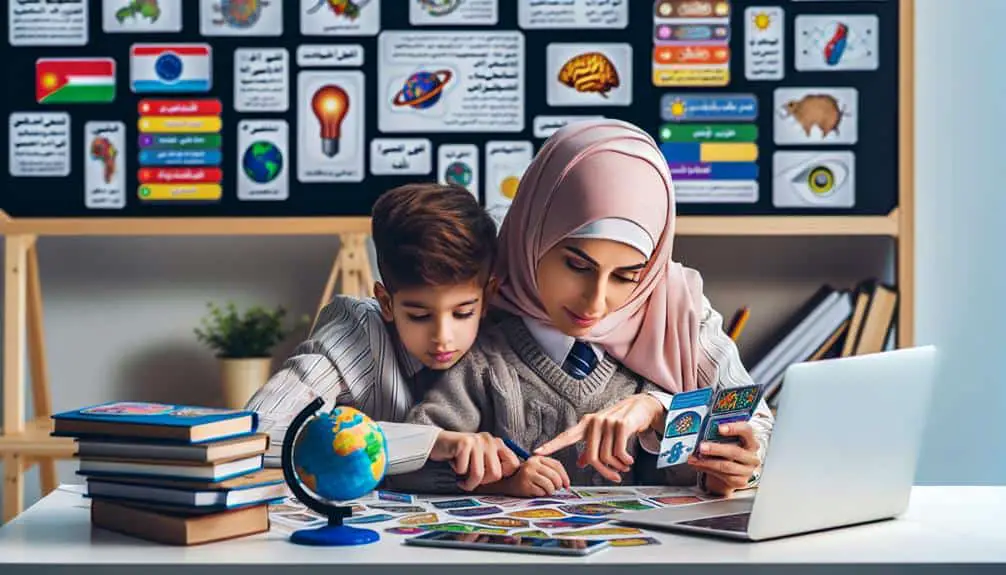To enhance social-emotional learning while homeschooling, focus on nurturing emotional intelligence through activities that develop self-awareness, empathy, and decision-making skills. Create a positive atmosphere by offering support and reinforcing positive behaviors. Encourage open emotional expression and validate feelings to help kids navigate emotions effectively. Promote empathy and kindness through leading by example and engaging in acts that foster compassion. Incorporate mindfulness practices like breath awareness to enhance emotional regulation and concentration. Build social skills through interactive activities that encourage empathy, teamwork, and effective communication. Consider trying role-playing, problem-solving tasks, and communication games. These strategies can boost your child's emotional growth and connection.
Key Points
- Encourage emotional expression through activities like journaling and art.
- Model empathy and kindness in interactions to foster compassion.
- Incorporate mindfulness practices for emotional regulation and stress reduction.
- Engage in group problem-solving activities to enhance social skills.
- Teach resilience and coping strategies for bouncing back from setbacks.
Understanding Social-Emotional Learning
Understanding social-emotional learning involves recognizing and developing the essential skills needed for managing emotions, building relationships, and making responsible decisions. Emotional intelligence plays a vital role in this process, as it encompasses self-awareness, self-regulation, empathy, and motivation. By nurturing emotional intelligence, individuals can better understand and control their emotions, leading to improved social connections and overall well-being.
Developing social connections is another key aspect of social-emotional learning. Research indicates that strong social ties are linked to increased happiness, better mental health, and even academic success. Encouraging children to engage in activities that promote social interaction, such as group projects, cooperative games, or community service, can enhance their social skills and emotional resilience.
Incorporating lessons on emotional intelligence and fostering social connections in your homeschooling curriculum can provide a solid foundation for your child's social-emotional development. By prioritizing these skills, you're equipping them with the tools necessary to navigate relationships, manage conflicts, and make sound decisions in various aspects of their lives.
Creating a Positive Learning Environment
To cultivate a positive learning environment in homeschooling, fostering a supportive and encouraging atmosphere is crucial. Positive reinforcement plays a significant role in shaping behavior and attitudes. Encouraging good behavior through praise and rewards can motivate your child to stay engaged and enthusiastic about learning. Similarly, effective behavior management strategies such as setting clear expectations, establishing routines, and providing consequences for negative actions can help maintain a harmonious learning environment.
Emotional regulation is another essential aspect of creating a positive homeschooling atmosphere. Teaching your child how to identify and manage their emotions can lead to improved focus, self-control, and overall well-being. Conflict resolution skills are also crucial in a homeschool setting. Encouraging open communication, active listening, and problem-solving can help address conflicts constructively and foster a sense of collaboration and understanding within the learning environment.
Encouraging Emotional Expression
Encouraging children to express their emotions openly and constructively is vital in fostering their social-emotional development during homeschooling. Emotional regulation plays a significant role in how children navigate their feelings and interactions with others. By acknowledging and validating your child's emotions, you create a safe space for them to express themselves authentically. This practice not only helps in developing their emotional intelligence but also strengthens the parent-child bond.
Empathy building is another key aspect of encouraging emotional expression. When children learn to recognize and understand their own emotions, they become more adept at recognizing and empathizing with the feelings of others. Engaging in conversations about emotions, asking open-ended questions, and actively listening to your child's perspective are effective ways to cultivate empathy.
Incorporating activities like journaling, art, or role-playing can also aid in emotional expression and regulation. These activities provide children with creative outlets to explore and communicate their feelings. By fostering a supportive environment that values emotional expression, you empower your child to navigate their emotions effectively and develop essential social skills.
Promoting Empathy and Kindness
Promoting empathy and kindness in children is essential for nurturing their social-emotional skills and fostering positive relationships with others. Teaching children to understand and share the feelings of others can have a profound impact on their ability to connect with people and navigate social situations effectively.
Here are four practical ways to promote empathy building and kindness activities in your homeschooling environment:
- Model Empathy: Demonstrate empathy in your interactions with your child and others. Children learn best by observing and imitating behaviors, so modeling empathy sets a powerful example.
- Encourage Perspective-Taking: Help children see things from different points of view. Discuss how others might feel in certain situations to broaden their understanding of empathy.
- Practice Acts of Kindness: Engage in random acts of kindness as a family. Encourage your child to participate in activities that promote compassion and generosity towards others.
- Use Literature and Media: Explore books, movies, or shows that highlight empathy and kindness. Discuss the characters' actions and emotions to deepen empathy skills in children.
Incorporating Mindfulness Practices
To enhance social-emotional learning in your homeschooling environment, incorporating mindfulness practices can be highly beneficial. Research shows that mindfulness can improve focus, reduce stress, and enhance emotional regulation, all vital skills for academic success and overall well-being.
Benefits of Mindfulness
Cultivating mindfulness in homeschooling environments can greatly enhance children's social-emotional development and overall well-being. Research suggests that incorporating mindfulness practices can lead to stress reduction and improved focus in children. Here are four key benefits of mindfulness in homeschooling:
- Emotional Regulation: Mindfulness helps children recognize and manage their emotions effectively, leading to better self-control and reduced stress levels.
- Enhanced Concentration: By practicing mindfulness, children can improve their focus and attention span, which can positively impact their academic performance.
- Improved Relationships: Mindfulness fosters empathy and compassion, helping children develop healthier and more positive relationships with others.
- Stress Reduction: Mindfulness techniques can equip children with tools to cope with stressors, promoting a sense of calm and inner peace.
Simple Mindfulness Exercises
Incorporating simple mindfulness exercises into daily homeschooling routines can greatly enhance children's emotional intelligence and cognitive abilities. Two effective practices are breath awareness and body scans.
Breath awareness involves focusing on the sensation of breathing, which can help children regulate emotions and improve concentration. Encouraging kids to take deep breaths when feeling overwhelmed can support self-control and reduce stress.
Body scans involve systematically bringing attention to different parts of the body, noticing any tension or sensations present. This practice promotes self-awareness and relaxation.
Encouraging children to practice these mindfulness exercises regularly can contribute to their overall well-being and academic success. By integrating these simple techniques into your homeschooling routine, you're nurturing essential social-emotional skills that will benefit your child's development.
Mindful Communication Techniques
Integrating mindful communication techniques into your homeschooling environment can foster a deeper connection and understanding between you and your child, enhancing not only their social-emotional skills but also their overall well-being. Here are four practical tips to incorporate effective listening and reflective speaking in your interactions with your child:
- Practice Active Listening: Give your child your full attention, maintain eye contact, and show empathy through your responses.
- Encourage Open Communication: Create a safe space for your child to express their thoughts and feelings without judgment.
- Use Reflective Speaking: Mirror your child's emotions and thoughts to show understanding and validate their experiences.
- Be Mindful of Nonverbal Cues: Pay attention to your body language and tone of voice to make sure your communication is supportive and encouraging.
Building Social Skills Through Interaction
Engaging in role-playing activities can help cultivate empathy in your homeschooling environment.
Encouraging group problem-solving tasks can enhance your child's social skills and teamwork abilities.
Communication games can be a fun way to strengthen bonding and improve interaction among family members.
Role-Playing for Empathy
Utilizing role-playing exercises can effectively cultivate empathy and enhance social skills in homeschooling settings. Role playing scenarios allow for immersive experiences that help children understand different perspectives and develop empathy towards others.
Here are four practical tips for incorporating role-playing into your homeschooling routine:
- Choose Diverse Scenarios: Select role-playing scenarios that cover a wide range of emotions and social situations to help children practice empathy in various contexts.
- Encourage Discussion: After each role-playing session, facilitate a discussion where children can reflect on the emotions they experienced and brainstorm ways to show empathy.
- Rotate Roles: Encourage children to take on different roles in scenarios to understand multiple viewpoints and foster empathy towards various perspectives.
- Provide Positive Feedback: Offer constructive feedback and praise to reinforce empathetic behaviors, encouraging children to continue developing their social skills through role-playing.
Group Problem-Solving Activities
Group problem-solving activities in homeschooling provide valuable opportunities for children to enhance their social skills through interactive collaboration and critical thinking. Engaging in creative problem-solving tasks within a group setting encourages children to think outside the box, consider diverse perspectives, and communicate effectively with their peers.
Collaborative activities such as mystery-solving challenges, building complex structures together, or organizing a virtual scavenger hunt can foster teamwork, decision-making skills, and conflict resolution abilities. These activities not only promote social interaction but also help children develop essential problem-solving strategies that can be applied in various real-life situations.
Communication Games for Bonding
Communication games play an important role in nurturing social skills and fostering strong bonds among homeschooling children. Engaging in these activities not only enhances communication abilities but also promotes trust building and emotional connection within the family unit. Here are four interactive games that can help your children develop essential social skills and deepen their relationships:
- Mirror, Mirror: Sit facing each other and take turns mirroring each other's movements. This game promotes empathy and enhances non-verbal communication skills.
- Storytelling Relay: Create a collaborative story by taking turns adding sentences. This fosters cooperative challenges and boosts creativity.
- Emotion Charades: Act out various emotions for others to guess. This game enhances emotional intelligence and empathy.
- Would You Rather: Pose hypothetical scenarios to prompt discussion. This activity encourages listening skills and understanding differing perspectives.
Fostering Resilience and Coping Strategies
To enhance your child's ability to navigate challenges effectively, focus on building their resilience and teaching them practical coping strategies. Engaging your child in resilience activities can greatly impact their ability to bounce back from setbacks. Encourage activities that promote problem-solving, decision-making, and emotional regulation. These can include setting achievable goals, emphasizing a growth mindset, and celebrating small victories.
In addition to resilience activities, coping strategies training is essential. Teach your child various coping mechanisms such as deep breathing exercises, mindfulness techniques, and positive self-talk. Encourage them to express their emotions through journaling, art, or talking to a trusted individual. By equipping your child with a toolbox of coping strategies, you empower them to manage stress and anxiety effectively.
Modeling resilience and healthy coping mechanisms yourself can also have a profound impact on your child. Show them how you handle challenges, regulate your emotions, and seek support when needed. By fostering resilience and teaching practical coping strategies, you provide your child with invaluable skills to navigate life's ups and downs.




